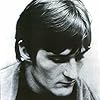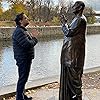Poll
Poll added by: Trevor
Comments Showing 1-23 of 23 (23 new)
date newest »
newest »
 newest »
newest »
I endured rather than enjoyed Kafka - which is perhaps in the spirit of his topics, but it also means I've never been among those giving him 5* rave reviews.
Death in Venice is one of those works - as both book and film - which I found at the right time. It's my perception that more people (or a higher proportion of people) push away Death in Venice because of the squicky aspect of the protagonist's obsession with a child, with whom he has no direct contact, than they do Lolita where abuse physically occurs, repeatedly. (Nabokov, though, has remained much more of a big deal as a writer, whereas Mann is perhaps less so these days.) I think that this aspect of the plot makes it much easier to transpose Death in Venice for oneself, to make it about other things, other people; it is very atmospheric and if one is prepared to see it flexibly, it can be about mortality, about an aspect of one's life being over, about any sort of unrequited or lost love (including a younger woman thinking about an older man), about cultural history - the demise of the aesthetic movement (which itself had an attraction to decay) as the First World War looms - or about the organised, orderly individual falling into a state of decadent aestheticism for which he'd previously had little respect.
I have seen the film three times: the first I found it terribly boring, but the second and third I got it completely, because I was in the right place. If one is not an absolutely serious cineaste (I'm not counting myself as one because 2001 bored me) and has no particular interest in its mood, it may indeed be slow. But it evokes what it evokes excellently.
(I have not read any of the Other Stories; I used to have an old film-tie in Penguin that contained only Death in Venice itself.
Death in Venice is one of those works - as both book and film - which I found at the right time. It's my perception that more people (or a higher proportion of people) push away Death in Venice because of the squicky aspect of the protagonist's obsession with a child, with whom he has no direct contact, than they do Lolita where abuse physically occurs, repeatedly. (Nabokov, though, has remained much more of a big deal as a writer, whereas Mann is perhaps less so these days.) I think that this aspect of the plot makes it much easier to transpose Death in Venice for oneself, to make it about other things, other people; it is very atmospheric and if one is prepared to see it flexibly, it can be about mortality, about an aspect of one's life being over, about any sort of unrequited or lost love (including a younger woman thinking about an older man), about cultural history - the demise of the aesthetic movement (which itself had an attraction to decay) as the First World War looms - or about the organised, orderly individual falling into a state of decadent aestheticism for which he'd previously had little respect.
I have seen the film three times: the first I found it terribly boring, but the second and third I got it completely, because I was in the right place. If one is not an absolutely serious cineaste (I'm not counting myself as one because 2001 bored me) and has no particular interest in its mood, it may indeed be slow. But it evokes what it evokes excellently.
(I have not read any of the Other Stories; I used to have an old film-tie in Penguin that contained only Death in Venice itself.
I have read two of Mann's epics (The Magic Mountain and Doctor Faustus) but not this one. Kafka is wonderful but he didn't know how to finish a novel. A tough call but I think Mann shades it...
 Many is the time that I have heard, or seen written, references to something being Kafkaesque. The Trial is Kafka's defining work and he has influenced generations of writers with his writing style.
Many is the time that I have heard, or seen written, references to something being Kafkaesque. The Trial is Kafka's defining work and he has influenced generations of writers with his writing style.A genius.
 Jonathan wrote: "Many is the time that I have heard, or seen written, references to something being Kafkaesque. The Trial is Kafka's defining work and he has influenced generations of writers with his writing style..."
Jonathan wrote: "Many is the time that I have heard, or seen written, references to something being Kafkaesque. The Trial is Kafka's defining work and he has influenced generations of writers with his writing style..."Agreed. There aren't many books / authors whose work is so epochal as to give rise to a commonly used (not just in literature) adjective. Dickensian perhaps - any/many others?
Death in Venice isn't in the same league to me - even if we'd picked Doctor Faustus I would struggle this was a fair contest.
Paul wrote: "There aren't many books / authors whose work is so epochal as to give rise to a commonly used (not just in literature) adjective. Dickensian perhaps - any/many others?"
I'll gladly chase this tangent! I think these are commonly used to describe things outside of literature:
-Shakespearean
-Homeric
-Proustian
-Dantesque
And, for good measure: sadistic!
I'll gladly chase this tangent! I think these are commonly used to describe things outside of literature:
-Shakespearean
-Homeric
-Proustian
-Dantesque
And, for good measure: sadistic!
 Good ones.
Good ones. But think those are examples that prove the rule that you have to make a major impact to coin your own adjective. Three of those four weren't eligible as we have had to go back hundreds of years to find them.
Is Proust in the tournament by the way?
 I personally use Bernhardian quite often about a good rant.
I personally use Bernhardian quite often about a good rant. And I think Ferrantesque will soon catch on as a widely acknowledged work of genius that is inexplicably under appreciated by some!
 Paul wrote
Paul wrote"And I think Ferrantesque will soon catch on as a widely acknowledged work of genius that is inexplicably under appreciated by some!"
Please don't taint a clash of titans with froth of this sort
Paul wrote: "But think those are examples that prove the rule that you have to make a major impact to coin your own adjective. Three of those four weren't eligible as we have had to go back hundred..."
Oh, I agree totally. I'm trying to think of how we can get Mannesque into general conversation, and what it would even mean.
Oh, I agree totally. I'm trying to think of how we can get Mannesque into general conversation, and what it would even mean.
 A tangent on a tangent; in the way that Dickens, or Kafka entered the lexicon describing a sense or movement, and transcending literature, has there ever been a book title to equal Catch 22 for enduring meaning; that's come to represent a generally understood message or sensation?
A tangent on a tangent; in the way that Dickens, or Kafka entered the lexicon describing a sense or movement, and transcending literature, has there ever been a book title to equal Catch 22 for enduring meaning; that's come to represent a generally understood message or sensation?
Sophie's Choice is the only one I can think of like that, too. There is Gaslight, but that's become part of general speech because of the film and not because of Hamilton's play (much less any novel).
Interesting. Surely there are others?
Interesting. Surely there are others?
 My Brilliant Friend? (The nefarious practice of logging in as someone else to further the cause of a favoured Mookse Madness title.)
My Brilliant Friend? (The nefarious practice of logging in as someone else to further the cause of a favoured Mookse Madness title.)
Ha ha!
For example, this morning I reached out to my brilliant friend and now Gilead is tied with Wolf Hall!
For example, this morning I reached out to my brilliant friend and now Gilead is tied with Wolf Hall!
Now, in case someone should think I actually did a my brilliant friend. While I did reach out to a friend this morning re: Gilead, and he is brilliant, I did so because I knew he'd love to see Gilead win. I never did log in as someone else. But my wife and ten-year-old son both have relatively inactive GR accounts . . .
No, I won't do that!
No, I won't do that!




























By the vapors of memory and by his reputation Kafka should win, I feel, but I know I'm a big fan of Mann's short novel. I don't remember quite what it was all about, but I still remember the atmosphere of the scenes when I read Death in Venice. That's what I remember best, and I tend to favor, in the long term, books that feel like real places and times in my own life.
I remember less about The Trial, though I know I found it suitably frustrating. I don't remember the writing (don't remember what translation I read), and I know that I prefer some of Kafka's other famous works more, though I can't tell you why right now having read them a while back too!
So, my heart is telling me to go with Death in Venice because I think back on it in fondness, but I'm anxious to have some of you refresh my memory!